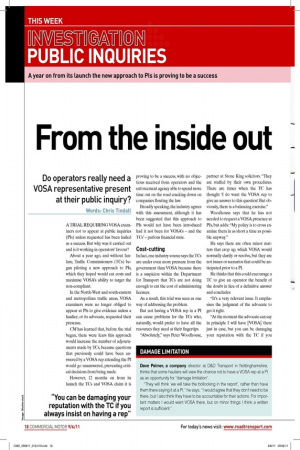From the inside out
Page 15

Page 16

If you've noticed an error in this article please click here to report it so we can fix it.
Do operators really need a VOSA representative present at their public inquiry?
Words: Chris Tindall
A TRIAL REQUIRING VOSA examiners not to appear at public inquiries (PIs) unless requested has been hailed as a success. But why was it carried out and is it working in operators’ favour?
About a year ago, and without fanfare, Trafic Commissioners (TCs) began piloting a new approach to PIs, which they hoped would cut costs and maximise VOSA’s ability to target the non-compliant.
In the North-West and south-eastern and metropolitan trafic areas, VOSA examiners were no longer obliged to appear at PIs to give evidence unless a haulier, or its advocate, requested their presence.
CM has learned that, before the trial began, there were fears this approach would increase the number of adjournments made by TCs, because questions that previously could have been answered by a VOSA rep attending the PI would go unanswered, preventing critical decisions from being made.
However, 12 months on from its launch the TCs and VOSA claim it is proving to be a success, with no objections received from operators and the enforcement agency able to spend more time out on the road cracking down on companies louting the law.
Broadly speaking, the industry agrees with this assessment, although it has been suggested that this approach to PIs would not have been introduced had it not been for VOSA’s – and the TCs’ – parlous inancial state.
Cost-cutting
In fact, one industry source says the TCs are under even more pressure from the government than VOSA because there is a suspicion within the Department for Transport that TCs are not doing enough to cut the cost of administering licences.
As a result, this trial was seen as one way of addressing the problem.
But not having a VOSA rep in a PI can cause problems for the TCs who, naturally, would prefer to have all the resources they need at their ingertips.
“Absolutely,” says Peter Woodhouse, partner at Stone King solicitors. “They are stuffed by their own procedures. There are times when the TC has thought ‘I do want the VOSA rep to give an answer to this question’. But obviously, there is a balancing exercise.” Woodhouse says that he has not needed to request a VOSA presence at PIs, but adds: “My policy is to cross examine them in as short a time as possible anyway.” He says there are often minor matters that crop up, which VOSA would normally clarify or resolve, but they are not issues or scenarios that could be anticipated prior to a PI.
He thinks that this could encourage a TC to give an operator the beneit of the doubt in lieu of a deinitive answer and concludes: “It’s a very relevant issue. It emphasises the judgment of the advocate to get it right.
“At the moment the advocate can say in principle I will have [VOSA] there just in case, but you can be damaging your reputation with the TC if you always insist on having a rep, and I don’t want to do that.” Lawyer Anton Balkitis, who heads up the transport law team at Rothera Dowson, says most of the time the report provided by VOSA as evidence is factually accurate and can be agreed without the need for them to appear.
Double-edged sword
“Having VOSA attend a PI can sometimes be a double-edged sword,” he says.
“It can work to the advantage of the operator, but other times it opens a can of worms. Many VOSA [vehicle and trafic examiners] are sympathetic to the plight of the operator, but not all.
“Generally, the main advantage in having VOSA attend is to explain any thing of a mechanical nature and to give their opinion on what measures should be taken to prevent reoccurrence of certain failures. However, this can backire where the operator has already been advised what to do and still hasn’t heeded advice at the time of the PI, which can sometimes happen. Not having VOSA attend can save time and money all round and work to the operator’s advantage.” Road Haulage Association chief executive Geoff Dunning supports the measure. “We can be critical of VOSA in a number of ways but I think if there’s one thing [VOSA chief executive] Alastair Peoples is committed to, it’s getting people out on the road and catching the non-compliant,” he says. “In a nutshell, we would prefer to see VOSA staff out catching the non-compliant rather than sitting around in PI waiting rooms. It’s ine in principle, but the devil is in the detail.
“It’s particularly important to bear in mind that there’s usually a signiicant track record of prohibitions at the roadside, convictions – a lot of evidence suggesting that the operator is called to PI,” continues Dunning. “The other side of the coin is that the TC is far more concerned in what has happened since the call up letter was sent out and how the operator has responded.”
Enforcement activities
VOSA says the idea “saves examiners time and travelling expenses, and allows them to spend more time on other enforcement activities” .
And one of the architects of the strategy, North West TC Beverley Bell, who has just been appointed deputy senior TC in addition to her role, says she will continue with the practice unless she receives any strong objections, adding: “This approach has led to a much more effective use of my PI time, which is to the beneit of all parties.
“Should any operator or VOSA feel strongly that the vehicle or trafic examiner should be present, then this will of course happen.
“However, I have been following this approach for some 12 months now and have not received any objections from operators, their lawyers or VOSA.” ■















































